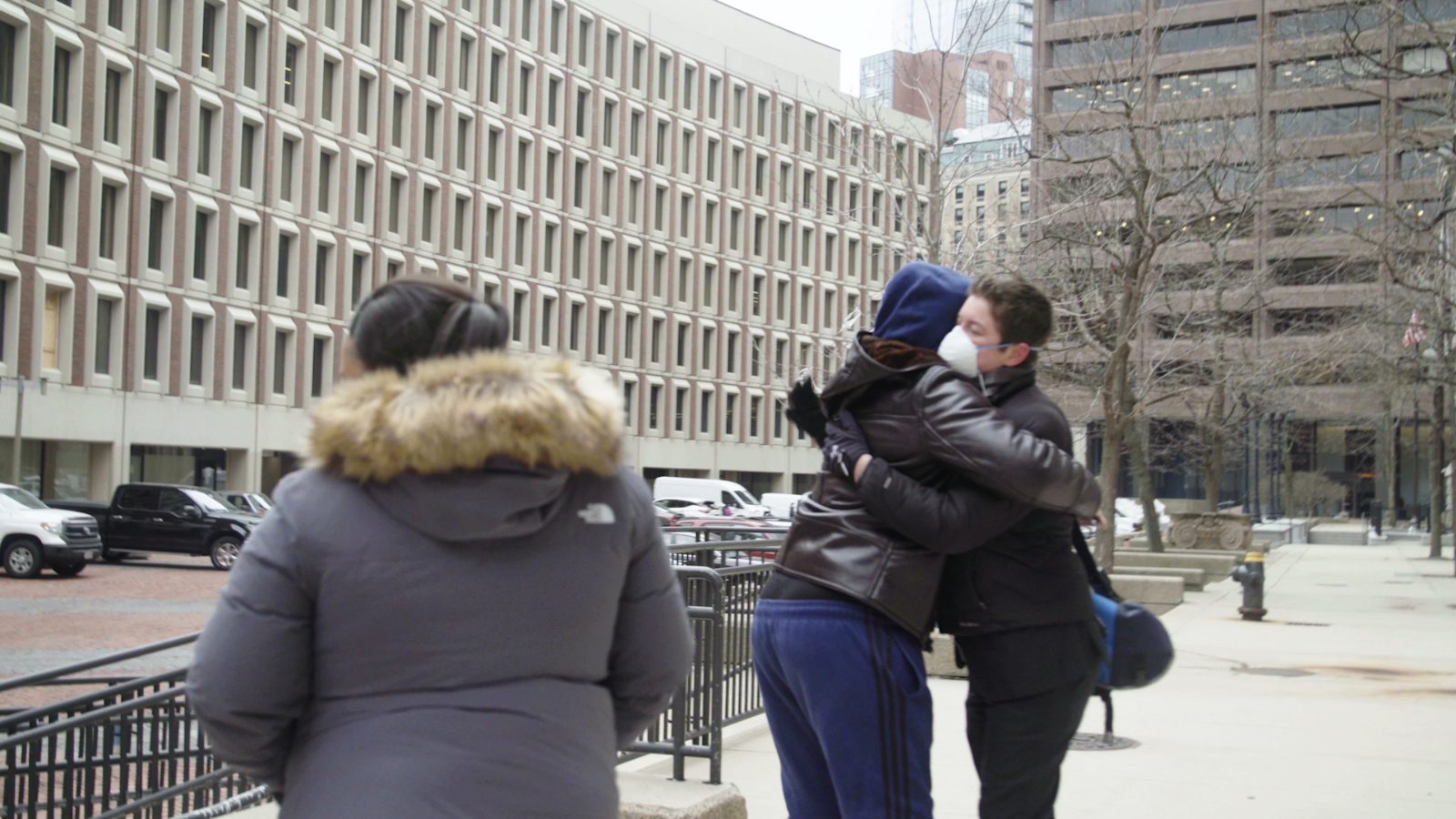by Jason Pugatch
Above”: Still from Deliberate Indifference: Covid-19 in Massachusetts Prisons; image courtesy Jason Pugatch, via The Boston Institute for Nonprofit Journalism.
One of every three people in Massachusetts jails and prisons was infected with COVID-19, according to data collected by the special master tasked with tracking, overseeing, and coordinating the response to the coronavirus inside these facilities. That’s compared to one in ten within the general population of the Commonwealth.
The data comes from confirmed positive tests, in facilities where regular symptomatic and asymptomatic testing was never implemented. Epidemiologists estimate that actual infections are as high as twice the confirmed reported rate.
Lisa Newman-Polk, an attorney who represents several clients inside Department of Correction (DOC) facilities, said that prisoners who showed signs of illness were transferred to quarantine dormitories, then released back to the general population, without any testing at all. “They get sent to the quarantine unit,” she said. “And if they report having no symptoms after 10 days, and they don’t have a fever, they are sent back to the regular unit.”
“Many of my clients have said that the quarantine conditions have been so egregious and so disgusting and filthy and inhumane that nobody wants to be placed in the quarantine unit,” she continued. “People are desperate to get out of there. So people are saying, I’m fine.”

Lack of testing protocols was one of the DOC’s many failures of leadership during the pandemic. The DOC falls within the executive branch of the Commonwealth, and under the stewardship of Gov. Charlie Baker and Commissioner Carol A. Mici, there seems to have been no systemic protocol for managing the virus inside carceral facilities in Mass.
A blatant path of obfuscation and delay is evident in court filings, with the DOC refusing to implement safeguards, or issue reports on case counts, until ordered to do so by the courts. Before vaccines became available, social distancing and mask wearing were the only known, effective mitigation strategies against the virus. Still, corrections officers were reported to be violating protocols; in other cases, prisoners were prevented from making their own masks.
While unpopular with the general public, reducing the number of people held in jails and prisons is proven to decrease viral transmission. In one study of an urban jail, decarceration proved to be the single most effective way of containing the spread of the virus.
“What’s really profound about their findings,” said Dr. Monik Jimenez, an epidemiologist at Brigham and Women’s Hospital/Harvard Medical School, “was that a 9% decrease in the size of the population led to a 56% decrease in the rate of transmission.”
Urged to expedite
Massachusetts prisons and jails operate beyond capacity, and by their own admission, 70% of prisoners were unable to maintain six feet of distance from others inside cells, chow halls, recreational areas, and dormitory settings. The many departments of the executive branch, which includes the parole board and the DOC, were urged by the Massachusetts Supreme Judicial Court (SJC) to “expedite parole hearings, to expedite the issuance of parole permits. . . to determine which individuals nearing completion of their sentences could be released on time served, and to identify other classes of inmates who might be able to be released.”
The SJC could not constitutionally order releases, it said in its opinion in Committee for Public Counsel Services v. Chief Justice of the Trial Court. But, to reduce transmission and save lives, the court urged the executive branch to do everything in its power to reduce the prison population.
The opposite occurred. While those in pre-trial detention, on shorter sentences, and with issues on appeal were given stays and released under supervision, the parole rate—those receiving a favorable parole vote—decreased in 2020 from the prior year. Despite the parole board being all but ordered to consider COVID-19 as a factor in its decision making, a prisoner had an 8% better chance at parole before the pandemic than during it.

For public defender Connor Barusch (featured in the film), who battled for a stay of sentence for his client John for the better part of a year, a larger systemic question looms. “Maybe this many people shouldn’t be in jail or prison in the first place.”
Instead of decarceration, the DOC’s mitigation strategy was locking down facilities, keeping prisoners in cells for 23 hours a day. Movement was severely restricted; hot meals consisted of warmed sandwich meat on bread. Prisoners had one hour a day to go outside, shower, or make phone calls to loved ones. In-person visitation was suspended for the better part of a year.
The DOC did not begin reporting deaths caused by COVID-19 until July of last year, four months into the pandemic. In one week, the DOC reported testing 1,310 prisoners, while testing only 49 the following week, numbers that appear erratic. Active cases were not reported until after the first surge subsided in late June. Given that prisoners reported moving in and out of quarantine units without testing, it is unclear how the DOC made determinations of active case counts. The DOC is currently downwardly revising their numbers per an audit, in an effort that seems to rewrite history.
“The only way to really explain it, is that we just don’t care about this population. We’re okay with seeing people get sick with long-term consequences, if they recover.”
Attorney Elizabeth Matos of Prisoners Legal Services
Deathbed parole, perhaps the most malicious example of the DOC’s mishandling of the virus, has been widely reported. Once intubated and placed on ventilators, prisoners were deemed permanently incapacitated and granted medical parole that they had sought prior to becoming infected, out of fear of that very outcome. Medical parole is separate from the process of parole run by the parole board, and is at the DOC commissioner’s discretion.
“Immoral,” “irresponsible”
In the case of Joe Messere, who is featured in my film, a request for medical parole was filed (while he was intubated) on his behalf by the “staff of MCI Norfolk.” While not illegal, it’s rare for a prison to petition to parole its own prisoners.
Concurrently, the statewide medical director for Wellpath (the contractor that oversees DOC healthcare), Dr. Steven Descoteaux, advocated for taking Mr. Messere off the ventilator and beginning end of life care. When the Norfolk County District Attorney, notified of the petition on Dec. 15, 2020, requested a hearing on the matter, they were denied. Commissioner Mici rendered her decision to grant medical parole five days (including a weekend) later. The ethics committee at the hospital where Mr. Messere was being held overruled Dr. Descoteaux’s request to hasten Joe Messere’s death.
Men and women in our public institutions, under state control, were met with indifference, delay, callousness, and cruelty, when all they asked was to live another day and serve out their sentences alive.
The speed of authorizing releases for those critically ill or dying, compared to the hundreds who petitioned for medical parole in order to avoid such a fate, is staggering. The DOC, while stonewalling requests for home-confinement programs, acted expeditiously when the interest was their own. The department is now revoking the medical paroles of those who they thought would die, but subsequently recovered.
A year-and-a-half into the pandemic, though case counts are down and vaccinations up, the human rights violations that occurred in the Commonwealth’s prisons and jails cannot be ignored. The lingering psychological trauma of isolation, nearly a year without family visitation, and the anxiety of getting sick or dying, will be lasting. The physical toll suffered by those who contracted COVID-19 is still unknown, but long-covid may become an issue for some.
“We should be looking at a heightened set of standards for this particular congregate setting, not a lower set of standards,” Attorney Elizabeth Matos of Prisoners Legal Services told me last December. “The only way to really explain it, is that we just don’t care about this population. We’re okay with seeing people get sick with long-term consequences, if they recover.”
“It’s really irresponsible. Also immoral.”
Deliberate Indifference: Covid-19 in Massachusetts Prisons, the short film I directed that accompanies this article, was produced in the height of the second surge. It follows two men who lived together on Tier 6-2 at MCI Norfolk. They served vastly disparate sentences—one a lifer, another on a five-year mandatory minimum—and met with vastly different outcomes.
When we send men and women to prison, we task the DOC with responsibility for their welfare and well-being. Our fathers, mothers, siblings, and children are placed not just in the custody, but in the care of the Commonwealth of Massachusetts and the Department of Correction. Men and women in our public institutions, under state control, were met with indifference, delay, callousness, and cruelty, when all they asked was to live another day and serve out their sentences alive.
The DOC was sued on several occasions in the past year, accused of acting with “deliberate indifference.” This term of law, the statute by which prisons and jails and their leaders can be held accountable, sets a pretty low bar.
Those in charge are asked not to act with reckless disregard for human life.
All they had to do was try.
Editor’s note: this piece first appeared in Dig Boston.
Deliberate Indifference: Covid-19 in Massachusetts Prisons is a Shepardgate Films production. It was produced and directed by Jason Pugatch. Funding for the film was provided by the Gardiner Howland Shaw Foundation.
The Boston Institute for Nonprofit Journalism assisted with the written feature above and collaborated with Shepardgate Films to help distribute Deliberate Indifference. You can read more BINJ reporting on Mass prisons and parole at binjonline.org and on the sites of their various partners statewide.

















You must be logged in to post a comment.